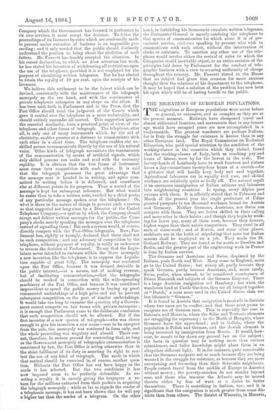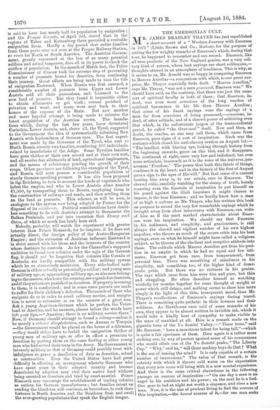THE MIGRATIONS OF EUROPEAN POPULATIONS.
THE migrations of European populations were never before so general, so extensive, and so complex as they are at the present moment. Railways have cheapened travel and
almost obliterated frontiers, and movements that in any former age would have occupied years are now accomplished in a twelvemonth. The greatest wanderers are perhaps Italians, for in Italy the struggle for existence is keener than in any other European land. The Royal Commission on Technical Education, who paid special attention to the condition of the- working-classes in the countries which they visited, found that the working-classes of Italy, both as touching pay and hours of labour, were by far the lowest in the scale. The factory-hands of Lombardy have to work fourteen and sixteen hours a day—sometimes twenty-four hours at a stretch—for a pittance that will hardly keep body and soul together.
Agricultural labourers are in equally evil case, and skilled workmen are relatively quite as badly off. The natural mph is an enormous immigration of Italian artisans and labourers into neighbouring countries. In spring, every Alpine pass swarms with them. It is officially stated that in February and March of the present year the single prefecture of Udine granted passports to ten thousand workmen bound for Austria and Germany. Neither Germans, Austrians, nor Swiss can compete with them. They are better skilled in their calling and more sober in their habits ; and though they begin by work- ing for lower pay, many of them earn, because they deserve, higher wages than their native competitors. They excel in all sorts of stone-work ; and at Zurich, and some other places, architects are in the habit of stipulating that none but Italian masons shall be employed on a job. They made the St. Gotbard Railway. They are found as far north as Dresden and Berlin, and the greater part of the engineering work in France is done by Italian navvies.
The Germans and Austrians and Swiss, displaced by the- Italians, push North and West.. Many come to England, more
go to the United States ; but nearly all, partly because they speak German, partly because Austrians, and, more rarely, Swiss, prefer, when abroad, to be considered countrymen of
Prince Bismarck and subjects of the German Emperor. There is a large Austrian emigration vid Hamburg ; but when the wanderers land at Castle Gardens, they are all lumped together as " Dutch," a term more used in the United States than our less idiomatic " German."
It is found in Austria that emigration is most rife in districts where two races are in conflict, and that those most prone to• emigrate are of German race. This is especially the case in Bohemia and Moravia, where the Selav and Teutonic elements are struggling for supremacy ; in the North of Hungary, where Germans have the upper-hand ; and in Galicia, where the population is Polish and German, and the Jewish element is being increased by immigration from Russia. It would, how- ever, be unsafe to lay down any general law on the subject ; the facts in question may be nothing more than curious coincidences, and fuller knowledge might place them in an altogether different light. It is, for instance, quite conceivable that the Germans emigrate not so much because they are being worsted in the struggle for existence, as because they are more enterprising and far-seeing than their Sclavonic neighbours.
People cannot travel from the middle of Europe to America without money ; the poverty-stricken do not wander beyond seas, and those who traverse the Atlantic may be moved thereto either by fear of want or a desire to better themselves. There is something in fashion, too ; and it is
significant that the emigration is much greater from some dis- tricts than from others. The district of Wisowitz, in Moravia, is said to have lost nearly half its population by emigration ; and the Prague Gazette, of April 3rd, stated that in the regions of Tabor and Kuttenberg there prevailed a veritable emigration fever. Hardly a day passed that entire families from those parts were not seen at the Prague Railway Station, en route for North or South America. The Austrian Govern- ment, greatly concerned at the loss of so many potential soldiers and actual taxpayers, does all in its power to check the outflow of population. In the month of March last, the Police Commissioner of Cracow took the extreme step of preventing a number of peasants, bound for America, from continuing their journey. Great efforts are being made to turn the tide of emigration Eastward. When Bosnia was first annexed, a considerable number of peasants from Upper and Lower Austria sold all their possessions, and hastened to the new land of promise. But they found it impossible either to obtain allotments or get work ; several perished of privation and want, and many were sent back to their homes at the expense of the State. But now another and more hopeful attempt is being made to colonise the latest acquisition of the Austrian crown. The inunda- tions which, during the last few years, have devastated Carinthia, Lower Austria, and, above all, the Tyrol, suggested to the Government the idea of systematically colonising New Austria with husbandmen of German race. The first experi- ment was made by the Governor of the Tyrol, who sent to North Bosnia seventy-two families, numbering 466 individuals, ruined by inundations of the Adige. Some Tyrolian families have gone thither of their own accord and at their own cost, and all receive free allotments of land, agricultural implements, and the means of subsistence pending the growth of their crops. Other provinces are following the example of the Tyrol, and Bosnia will soon possess a considerable population of sturdy German-speaking yeomen. It has also been proposed in tIle Reichstag to turn to account the horde of vagabonds who infest the empire, and who in Lower Austria alone number 41,000, by transporting them to Bosnia, employing them in the construction of railways and roads, and then settling them on the land as peasants. This scheme, as will be seen, is analogous to the system now being adopted by France for the disposal of its recidivists. Political considerations have doubt- less something to do with Austria's attempt to Germanise the Balkan Peninsula, and put into execution that Drang nach Osten, of which so much has lately been said.
Nobody, probably, will watch the experiment with greater interest than Prince Bismarck, for be inspires, if he does not actually direct, the foreign policy of the Austro-Hungarian Empire ; and the extension of Austrian influence Eastward is in strict accord with his ideas, and the interests of the country whose destinies he controls. As for the Chancellor's supposed ambition to found new colonies under the aegis of the German flag, it should not be forgotten that colonies like Canada or Australia are hardly compatible with the military system which he so strenuously maintains. Every able-bodied male German is either actually or potentially a soldier; and young men of military age, or approaching military age, as also men belong- ing to thereserve, who leave the country, are regarded as deserters, and if they return are punished as deserters. If property is coming to them, it is confiscated ; and in some cases parents are made to suffer for their children's defection. Thousands of those who emigrate do so in order to avoid military service, and emigra- tion is never so extensive as on the morrow of a great war. Ask a young American-German which he prefers, the Vater- land or America, and he answers, almost before the words have left your lips,—" America ; there is no military service there." Now, if Germany should attempt to found a colony—unless it be merely a colonic d'exploitation, such as Annam or Tonquin —the Government would be placed on the horns of a dilemma, —they would either have to forbid the emigration thither of young men of military age, or offer in effect a premium to desertion by putting them on the same footing as other young men who had served their term in the Army. No Government so intensely military as that of Germany could possibly treat with indulgence so grave a dereliction of duty as desertion, actual or constructive. Even the United States have bad great difficulty in effecting an arrangement whereby Germans who have spent years in their adopted country and become Americans by adoption may visit their native land without being arrested as deserters and tried by court-martial. Prince Bismarck may encourage the establishment of trading colonies as outlets for German manufactures ; but families intent on evading the blood-tax will continue, as heretofore, to seek their fortunes in North America and the Southern Seas, and swell the ever-growing populations that speak the English tongue.



































 Previous page
Previous page